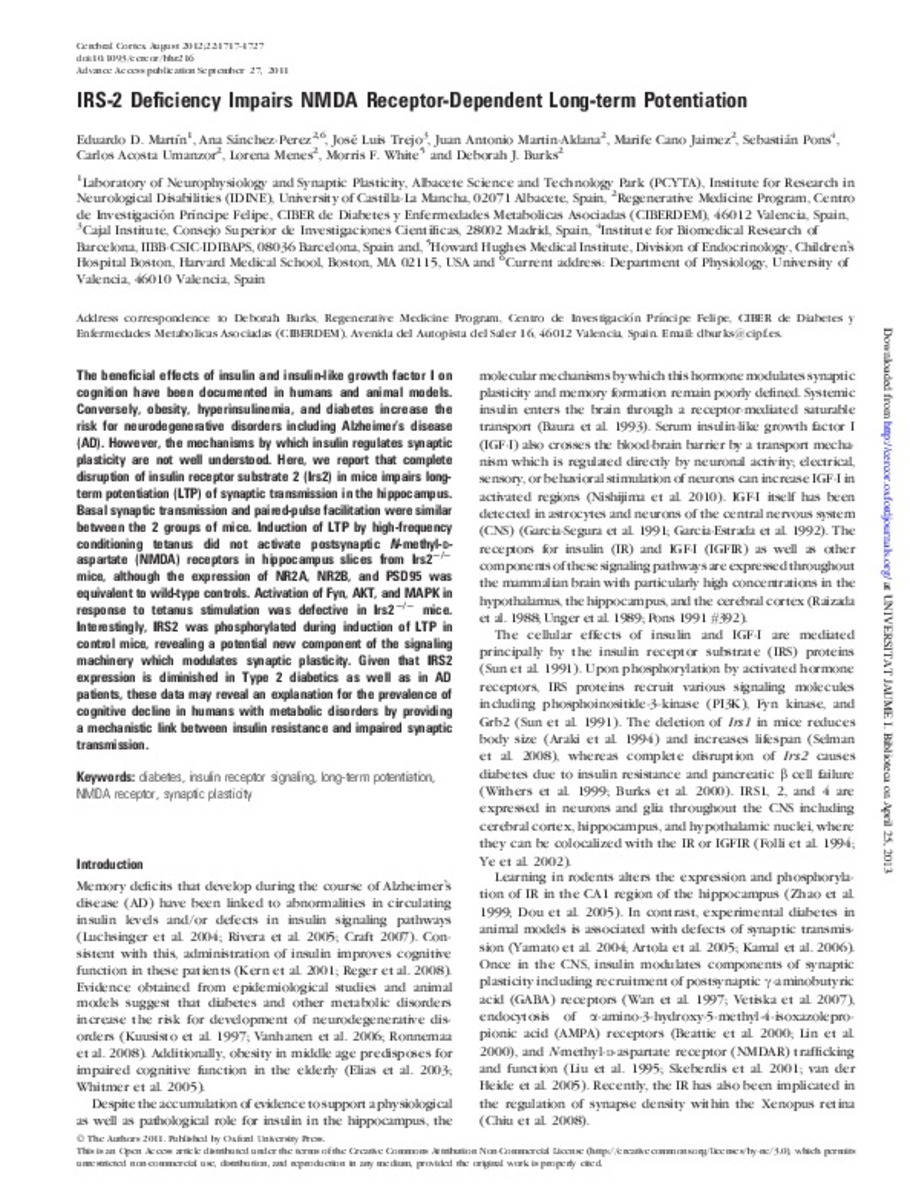Mostrar el registro sencillo del ítem
IRS-2 deficiency impairs NMDA receptor-dependent long-term potentiation
| dc.contributor.author | Sánchez-Pérez, Ana María | |
| dc.contributor.author | Martín, Eduardo D. | |
| dc.contributor.author | Trejo, José Luis | |
| dc.contributor.author | Martín Aldana, Juan Antonio | |
| dc.contributor.author | Cano Jaimez, Marife | |
| dc.contributor.author | Pons, Sebastian | |
| dc.contributor.author | Acosta Umanzor, Carlos | |
| dc.contributor.author | Menes, Lorena | |
| dc.contributor.author | White, Morris F. | |
| dc.contributor.author | Burks, Deborah J. | |
| dc.date.accessioned | 2013-04-25T10:58:35Z | |
| dc.date.available | 2013-04-25T10:58:35Z | |
| dc.date.issued | 2012-08 | |
| dc.identifier.issn | 1047-3211 | |
| dc.identifier.issn | 1460-2199 | |
| dc.identifier.uri | http://hdl.handle.net/10234/62224 | |
| dc.description.abstract | The beneficial effects of insulin and insulin-like growth factor I on cognition have been documented in humans and animal models. Conversely, obesity, hyperinsulinemia, and diabetes increase the risk for neurodegenerative disorders including Alzheimer’s disease (AD). However, the mechanisms by which insulin regulates synaptic plasticity are not well understood. Here, we report that complete disruption of insulin receptor substrate 2 (Irs2) in mice impairs longterm potentiation (LTP) of synaptic transmission in the hippocampus. Basal synaptic transmission and paired-pulse facilitation were similar between the 2 groups of mice. Induction of LTP by high-frequency conditioning tetanus did not activate postsynaptic N-methyl-Daspartate (NMDA) receptors in hippocampus slices from Irs22/2 mice, although the expression of NR2A, NR2B, and PSD95 was equivalent to wild-type controls. Activation of Fyn, AKT, and MAPK in response to tetanus stimulation was defective in Irs22/2 mice. Interestingly, IRS2 was phosphorylated during induction of LTP in control mice, revealing a potential new component of the signaling machinery which modulates synaptic plasticity. Given that IRS2 expression is diminished in Type 2 diabetics as well as in AD patients, these data may reveal an explanation for the prevalence of cognitive decline in humans with metabolic disorders by providing a mechanistic link between insulin resistance and impaired synaptic transmission | ca_CA |
| dc.format.extent | 11 p. | ca_CA |
| dc.format.mimetype | application/pdf | ca_CA |
| dc.language.iso | eng | ca_CA |
| dc.publisher | Oxford University Press | ca_CA |
| dc.relation.isPartOf | Cerebral Cortex, 2012, agost, Vol. 22, num. 8 | ca_CA |
| dc.rights | This is an Open Access article distributed under the terms of the Creative Commons Attribution Non-Commercial License (http://creativecommons.org/licenses/by-nc/4.0), which permits unrestricted non-commercial use, distribution, and reproduction in any medium, provided the original work is properly cited. | ca_CA |
| dc.rights.uri | http://creativecommons.org/licenses/by-nc/4.0/ | |
| dc.subject | Diabetes | ca_CA |
| dc.subject | Insulin receptor signaling | ca_CA |
| dc.subject | Long-term potentiation | ca_CA |
| dc.subject | NMDA receptor | ca_CA |
| dc.subject | Synaptic plasticity | ca_CA |
| dc.title | IRS-2 deficiency impairs NMDA receptor-dependent long-term potentiation | ca_CA |
| dc.type | info:eu-repo/semantics/article | ca_CA |
| dc.identifier.doi | http://dx.doi.org/10.1093/cercor/bhr216 | |
| dc.rights.accessRights | info:eu-repo/semantics/openAccess | ca_CA |
| dc.relation.publisherVersion | http://cercor.oxfordjournals.org/content/22/8/1717.full.pdf+html | ca_CA |
| dc.type.version | info:eu-repo/semantics/publishedVersion |
Ficheros en el ítem
Este ítem aparece en la(s) siguiente(s) colección(ones)
-
MED_Articles [640]
Articles de publicacions periòdiques
Excepto si se señala otra cosa, la licencia del ítem se describe como: This is an Open Access article distributed under the terms of the Creative Commons Attribution Non-Commercial License (http://creativecommons.org/licenses/by-nc/4.0), which permits unrestricted non-commercial use, distribution, and reproduction in any medium, provided the original work is properly cited.








